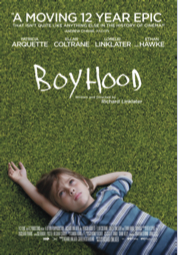
By: Scott Harvey, Columnist
Director Richard Linklater seems to have taken the term “coming-of- age” quite literally with his extraordinary new drama “Boyhood.”
In 2001, Linklater began filming Boyhood with a singular idea in mind: to chronicle the life of a young boy from the age of six to 18 in real time, so to speak, with new scenes shot every year to reflect the physical changes in his actors. The story itself is fictional, but the growth of the actors is very real. Ellar Coltrane is the young actor who Linklater cast at age six to play the lead role of Mason. How Linklater could have predicted that Coltrane would turn out to be such a charismatic and mature actor 12 years later is unfathomable, yet that is exactly what Coltrane grows to become. As the film opens, we see Mason and his older sister Samantha (Lorelai Linklater, the director’s daughter) living with their mother (Patricia Arquette), a hard-working college professor who wants a good life for her children. Mason’s father (Ethan Hawke) is a magnetic, but often irresponsible free spirit who only sees his children every few months.
That, however, is only the beginning of the movie. Over the next 3 hours, Mason and the other characters grow and age, not just physically, but mentally and emotionally as well. I will not spoil anything, but the characters you get at the beginning of “Boyhood” are not the characters you find at the movie’s end. That is not something many films can say. “Boyhood” is essentially plotless, but it is never kitschy. It is not one of those roadmap movies that only slow down when some “landmark” event happens, like Mason’s first kiss or his first day of high school or the first time he has a beer. It is not just a collection of postcards. Instead, “Boyhood” is about the moments and experiences, however significant or insignificant, that are essential to growing up, that shape people into who they eventually become. Every scene has a purpose.
I have already mentioned how strong Coltrane is, but the rest of the cast is superb as well. Arquette hits just the right note as Mason’s mother and Lorelai Linklater is a revelation as Samantha. Ethan Hawke, however, gives the most memorable performance in the film as Mason’s father. Arguably, he grows up more than any other character in the film. Not many actors could sustain this kind of a character for 12 years, but Hawke slips into the role effortlessly and disappears into the character of Mason Sr. If his performance is not nominated for a Best Supporting Actor Oscar, then I will retire from being a fake movie critic forever, because I clearly have no idea what I’m doing.
Finally, the real star of the movie is Richard Linklater. Linklater was one of our finest directors even before he made “Boyhood,” with movies like the “Before Sunrise” trilogy, “School of Rock,” “Dazed and Confused,” and the lovely “Me and Orson Welles” (If you have not seen this film, you should do so immediately) under his belt. Nevertheless, Linklater has very clearly outdone himself here. Having Linklater’s ambition is one matter, but channeling it into such a moving and incredibly satisfying film is a masterstroke. Not only do we watch the characters grow up, we also see the world itself evolving before our eyes.
Linklater makes careful note of our cultural progression throughout “Boyhood,” particularly in the film’s downright flawless soundtrack. The film’s music moves from “Soak Up the Sun” to “1901” and “Helena Beat” without hitting a wrong note (I would be remiss if I did not also praise his use of “Suburban War” from the most beautiful album ever made, Arcade Fire’s “The Suburbs”). This is, without question, a movie for our time.
There are things one can pick at in “Boyhood.” The movie is sometimes obvious and hardly subtle (a climactic scene where the family is confronted by the man who used to work on their septic lines is somewhat groan-worthy). Nevertheless, these qualms seem trivial in the face of such a triumph. “Boyhood” is not a perfect film, but it is one of the most stunning achievements in American film in many years. It is a movie going experience that viewers will never forget.
Grade:Are you kidding me? A+
Note: If you do not feel something during the last 10 minutes of this movie, then I would advise seeing a cardiologist.
